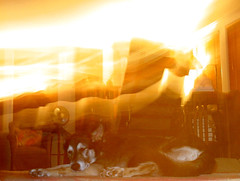Warning: Insane conspiracy-mongering ahead!
With Lynndie England about to
go back on trial, the reports about the
abuse of prisoners at Bagram air base, and the
Newsweek imbroglio, these passages have been haunting me.
In May 2003, a little piece of the First Earth Battalion philosophy was put into practice, by PsyOps, behind a disused railway station in the tiny Iraqi town of al-Qa'im, on the Syrian border, shortly after President Bush had announced "the end of major hostilities."
The story begins with a meeting between two Americans -- a Newsweek journalist named Adam Piore and a PsyOps sergeant named Mark Hadsell.
[...]
One night, Adam was hanging out in the squadron command center when Sergeant Hadsell wandered over to him. Hadsell winked conspiratorially and said, "Go look out where the prisoners are."
Adam knew that the prisoners were housed in a yard behind the train station. The army had parked a convoy of shipping containers back there, and as Adam wandered toward he could see a bright flashing light. He could hear music too. It was Metallica's "Enter Sandman."
From a distance it looked as though some weird and slightly sinister disco was taking place amid the shipping containers. The music sounded especially tinny , and the light was being joylessly flashed on and off, on and off.
Adam walked toward the light. It was really bright. It was being held by a young American soldier, and he was just flashing it on and off, on and off, in the shipping container. "Enter Sandman" was reverberating inside the container, echoing violently around the steel walls. Adam stood there for a moment and watched.
The song ended and then, immediately, it began again.
The young soldier holding the light glanced over at Adam. He continued flashing it and said, "You need to go away now."
"Ha! " said Adam to me, back in the Newsweek offices. "That's the term he used. 'You need to go away.'"
"Did you look inside the container?" I asked him.
"No," said Adam. "When the guy told me that I had to go away, I went away." He paused. "But was kind of obvious what was going on in there."
Adam called Newsweek from his cell phone and pitched them a number of stories. Their favorite was the Metallica one.
"I was told to write it as a humorous thing," said Adam. "They wanted a complete playlist."
So Adam asked around. It turned out that the songs being blasted at prisoners inside the shipping container included Metallica's "Enter Sandman"; the soundtrack to the movie XXX; a song that went "Burn Motherfucker, Burn"; and, rather more surprisingly, the "I Love You" song from Barney & Friends...
Adam e-mailed the article to New York, where a Newsweek editor phoned the Barney people for a comment. He was put on hold. The on-hold music was the Barney "I Love You" song.
The last line of the article, written by the Newsweek editors, was: "It broke us too!"
--Jon Ronson, The Men Who Stare at Goats, "The Purple Dinosaur"
Adam Piore himself had told me that he was finding the impact of his Barney story quite baffling.
It has had a tremendous amount of attention," he said. "When I was in Iraq my girlfriend called to tell me she'd seen it scroll across the CNN ticker. I didn't believe her. I thought there must be some mistake. But then Fox News wanted to interview me. Then I heard it was on the Today show. Then I saw it in Stars & Stripes."
"How did they report it?" I asked him.
"As humorous," said Adam. "Always as humorous."
[...]
Kenneth Roth, of Human Rights Watch, could read the mood. He realized that if his responses to the journalists were overly austere, it would seem that he wasn't getting it. He would sound like a sourpuss.
So he said to journalists, myself included, "I have small kids. I can understand being driven crazy by the Barney theme song! If I had to have 'I Love You, You Love Me' played at high decibel over and over for hours, I might be willing to confess to anything as well!"
And the journalists laughed, but he would quickly add, "And I wonder what else is going on in those shipping containers while the music is being played! Perhaps the prisoners are being kicked around. Perhaps they're naked with a bag on their head. Perhaps they're chained and hanging upside down...[sic]"
But the journalists rarely, if ever, included those possibilities in their stories.
By the time I met Kenneth Roth he was clearly sick of talking about Barney.
"They have," said Kenneth, "been very savvy in that respect."
"Savvy?" I said.
He seemed to be implying that the Barney story had been deliberately disseminated just so all the human-rights violations being committed in postwar Iraq could be reduced to this one joke.
I put this to him and he shrugged his. He didn't know what was going on. That, he said, was the problem.
--Jon Ronson, The Men Who Stare at Goats, "The Predator"
One of the things that has always struck me about the Abu Ghraib...for lack of a better word...scandal is that while it is true that the release of the photos made the prison a household name and provoked more widespread disgust among Americans than would the clinical descriptions of what went on, the photos also seemed to be a means to hide the larger story. What's going on outside of the picture's frame? Why does England
look so desultory as she holds the leash? Why, after all, would they take the photos to begin with? Would they have done so if they thought they were doing anything wrong? That seems unlikely to me, and I don't mean
just "morally wrong," but rather wrong in terms of violating military rules. Perhaps they misunderstood their orders, but it has always seemed to me that they were
acting on some kind of orders.
Charges against England were abruptly dismissed Wednesday after a judge at Fort Hood, Tex., determined that England's guilty pleas were inappropriate. Testimony from Pvt. Charles A. Graner Jr. -- formerly England's lover and a higher-ranking Army soldier -- indicated that England was following orders and would not have known that her actions were wrong. Graner is serving a 10-year sentence for the abuse and is appealing his guilty verdict.
Graner's testimony indicated that England had not conspired with him to humiliate and abuse detainees, and a judge ruled that England could not then plead guilty to the charge. A few days earlier, England had agreed to accept responsibility for her actions in exchange for a lighter sentence than the 16 1/2 years in prison that she faced.
England appeared in some of the most iconic photographs of the Abu Ghraib abuse, the most notorious of which showed her posing with a naked detainee who was tethered to a leash. Graner said the tactic is standard in corrections to control unruly prisoners and that England posed thinking it was appropriate.
If the photos had a purpose beyond a few sadistic freaks wanting to share their illicit and illegal hobby with the folks back home, which, again, I think is surely the case, what was the purpose or purposes?
Were they going to be used by interrogators within Abu Ghraib to scare the shit out of other prisoners? Plausible. "Talk, or we'll put you on an unclean dog's leash and have our women drag you around naked." "Confess, or you'll be posing naked in a pyramid with the other Iraqi scum."
Or were they intended as a form of blackmail? If I'm not mistaken, the only soldiers who have been tried for the abuses at the prison have been those featured in the photos. Were they incriminated so that, should the abuses come out, they would be forced to take a plea deal in exchange for not naming other names? Perhaps less plausible, but not impossible.
Or was it something else that led those photos to be taken, and later, to be released to a horrified world?
Legal Fiction has been thinking along very different, but in some ways parallel lines, noting the consistent themes of some of the recent public outrage over press reports.
The point is that even if the Newsweek reporter was sloppy, the larger critique is true -- and everyone knows it. We torture people and tailor our torture to offend their specific religious and cultural beliefs. And this understandably bothers Bush supporters who like to preach about their morality and the moral superiority of our foreign policy. So they ignore it. But the dissonance doesn't go away. And thus when Isikoff comes along with sloppy fact-checking, the Hyena Chorus pounces and their shrieking strikes a chord precisely because it eases cognitive dissonance and distracts Bush supporters form the fact that they are ignoring a policy that will go down with Tuskegee and Japanese internment as one of the great moral stains of American history. This is also why the White House was so eager to jump on it. I suspect that even they have some sleepless nights when they reflect on what they have done, and how a tribunal at the Hague may view it years down the road when the full story is known.
Publius's point is that the sloppiness of the Rather memo screw up and Mike Isikoff's less than robust sourcing permitted stories that were basically true to be blown off the public consciousness. In both cases the sloppiness afforded an opening to the ever-present charge of "media bias" -- against Bush and against the military -- permitting supporters of Bush and the war to maintain their unsullied consciences by giving them an alternative narrative to focus on.
In some ways the Abu Ghraib photos had a similar effect. Yes, they were horrifying, disgusting, an insult to the honor of our fighting men and women. "But, but," we heard after the initial shock had begun to wane, "well, at least
we're not killing anyone in Abu Ghraib. We shut down the 'rape rooms, didn't we?"
And the spin machine was set in motion.
Rush Limbaugh reliably
rushed in to easily fill the gaping void that left those who unquestionably "Support the Troops!" not sure what to make of it.
Rumsfeld could express his disgust, and apologize (to whom and for what...not sure) before Congress, but
without being required to take any responsibility.
And Bush could express his disgust, and apologize (to whom and for what...not sure), but insist that interrogators in Iraq followed the law, without stating
whether he believes torture is legal or not.
And the rest of us could go on in the knowledge that we, as a nation don't condone such behavior; that what happened at Abu Ghraib was an isolated instance by a few "hillbillies"; that, really, what's the big deal?; that we really don't want to know why the detainee in the photo looks so terrified at merely being dragged on a leash, so let's just focus on the leash...and Lynndie England; that we hear there's more pictures that are even more horrific, but please god, I've seen enough; etc. And put another yellow magnetic ribbon on the back of the SUV.
Were the photos taken in an elaborate plot to lay the blame on a few individuals and mask the far harsher interrogation methods being used at the prison?
Seems crazy, right?
To paraphrase what Kenneth Roth Human Rights Watch said of the hilarious Barney theme story, I wonder what else is going on while those photos are being taken.
Maybe it does seems pretty unlikely that the photos were taken to turn this story into an "I Love You" Barney joke -- I tend to go with the PsyOps using them to break other prisoners theory -- but the photos did have the perhaps unintended consequence of diverting attention from the real story of how torture is being used in the so-called War on Terror.
Doing a Google search to see if there has been any official "response" to Ronson's entertaining, disturbing, whacked out book (none that I can find), I did find that
Ronson comes to similar conclusions.




